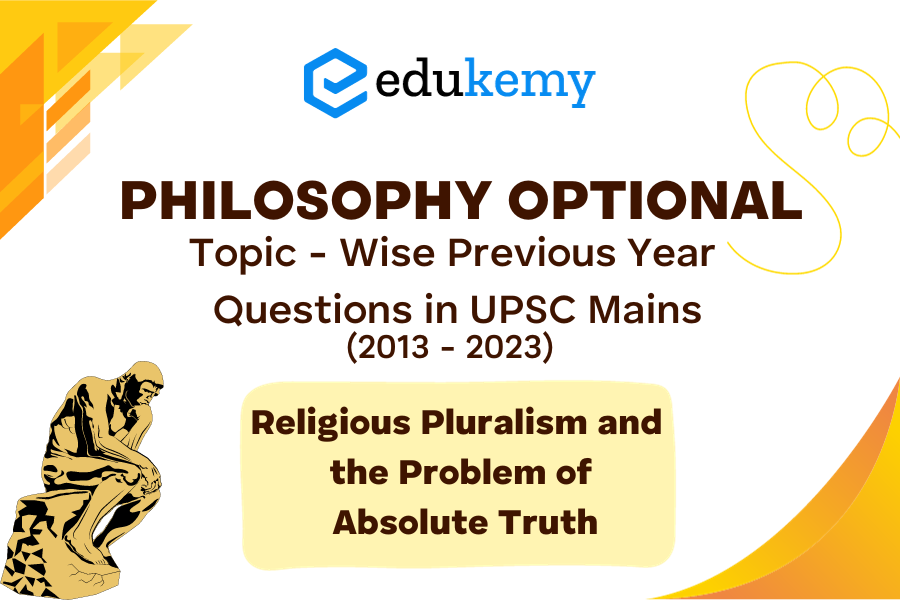
In the realm of civil services examinations in India, the UPSC Mains examination is often considered the ultimate test of a candidate’s knowledge, analytical skills, and depth of understanding on a wide range of subjects. For aspirants who have opted for the Philosophy optional paper, the study of religious pluralism and the problem of absolute truth is not just an academic pursuit but a philosophical exploration of profound questions that have shaped human societies for centuries. This blog delves into the past decade, from 2013 to 2023, to unravel the evolution of questions related to religious pluralism and the problem of absolute truth in the UPSC Mains Philosophy optional paper.
Philosophy, as a subject, challenges the intellect to grapple with complex ideas and engage in deep, contemplative discussions. The intersection of philosophy and religion, specifically the coexistence of multiple belief systems and the concept of an absolute truth, has been a recurring theme in the UPSC Mains examinations. In this blog series, we will embark on a journey through the previous year’s questions to analyze the trends, key concepts, and the evolving perspectives that the UPSC has explored in this realm. By doing so, we aim to provide valuable insights to aspiring civil servants who have chosen Philosophy as their optional subject, helping them navigate this intellectual terrain with confidence and finesse. So, let’s embark on this philosophical odyssey, tracing the trajectory of religious pluralism and the problem of absolute truth in the UPSC Mains from 2013 to 2023.
Contents
Religious Pluralism and the Problem of Absolute Truth Philosophy – Previous Year Questions (UPSC CSE Mains History Optional)
1. Does religion guarantee the absolute truth ? Discuss in the context of religious pluralism. (2017/15)
2. Can pluralist perspective vindicate Absolute Truth ? (2014/10)
3. If God is regarded as ‘one’, will it give rise to religious conflicts ?(2014/10)
4. On what grounds , dichotomy between ‘is’ and ‘ought’ can either be justified or rejected ? (2014/10)
5. Can the notion of absolute truth be justified on rational grounds ?(2012/12)
6. Do the concept of Ishvara and Brahman signify the same reality in Advait Vedanta ? (2012/12)
7. Explain the notion of truth as “Ekam Sat Viprah Bahudha Vadanti”(Truth is one, the learned interpret it differently.) 2011 – 20 marks
8. Does the notion of absolute truth give rise to intolerance and religious conflicts? Discuss. 2011 – 20 marks
9. How can religious conflicts about truth be resolved? Discuss. 2011 –20 marks
10. Is William James right in holding that religious disputes are like conflicts in aesthetic appreciation? Discuss. 2011 – 20 marks
11. Are religious doctrines and debates verifiable? Discuss. 2011 – 20marks
12. Examine the view that, religious doctrines are not ‘quasi-scientific’ doctrines but represent a form of life. 2011 – 20 marks
13. The fact that different religions originated at different places and indifferent centuries prove that plurality of religion is a fact. How correct would it be to say that all religions are essentially the same? Discuss. 10/20
14. “There are no whole truths, all truths are half-truths. It is trying to treat them as whole truth that plays the devil.” Discuss. 09/30.
15. Can the God of religion be identified with the absolute of philosophy? 09/30.
16. In a pluralistic society, how can religious pluralism be practised? Point out distinction among (a) sarvadharmasamanvaya (b)sarvadharmasambhava (c) sarvadharmasadbhava. 08/60
17. What is the central issue in the debate between religious plurali stand religious exclusivist? Discuss in this context the arguments they advance in support of their views.
FAQs
Q: What is the Religious Diversity of India?
Answer: India is known for its remarkable religious diversity, encompassing a multitude of faiths, such as Hinduism, Islam, Christianity, Sikhism, Buddhism, Jainism, and many more. This diversity is a reflection of the country’s long history and its secular and inclusive principles.
Q: What Does Religious Diversity Mean?
Answer: Religious diversity refers to the coexistence of various religious beliefs, practices, and traditions within a particular region or society. It signifies the presence of multiple faiths and denominations among the people living in a given area.
Q: What is Religious Pluralism in India?
Answer: Religious pluralism in India is the recognition and acceptance of multiple religions and beliefs within the nation’s social and cultural fabric. It is an essential aspect of India’s ethos and is reflected in the country’s constitutional commitment to secularism.
Q: How Does Religious Pluralism Impact Indian Society?
Answer: Religious pluralism in India has a profound impact on society, promoting tolerance, inclusivity, and mutual respect among individuals of different faiths. It fosters a rich tapestry of traditions and cultural exchange, contributing to the nation’s multicultural identity.
Q: What Does Religious Pluralism Mean in Sociology?
Answer: In sociology, religious pluralism refers to the coexistence of various religious groups and institutions within a society. Sociologists study how different religions interact, influence each other, and affect social dynamics, including issues related to identity, conflict, and cooperation.
In case you still have your doubts, contact us on 9811333901.
For UPSC Prelims Resources, Click here
For Daily Updates and Study Material:
Join our Telegram Channel – Edukemy for IAS
- 1. Learn through Videos – here
- 2. Be Exam Ready by Practicing Daily MCQs – here
- 3. Daily Newsletter – Get all your Current Affairs Covered – here
- 4. Mains Answer Writing Practice – here

